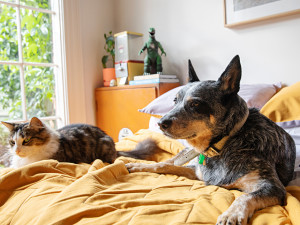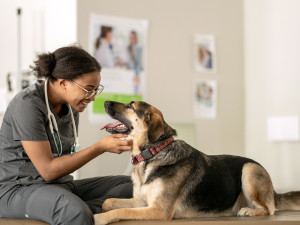Where to Get Help If You’re Struggling to Afford Your Pet
If you’re struggling with pet care costs, you are far from alone and there’s no shame seeking help. Here’s a few places to start

Share Article
Two years into the cost-of-living crisis, pet owners are turning to charities and shelters in record numbers with rehoming requests, unable to afford essential items such as food and medicine for their animals. ‘Giving up a pet’ is the ninth most visited page on the RSPCAopens in a new tab website, with 40,000 clicks from Google searches in March to May 2023 alone.
Charities, including the RSPCA, Cats Protectionopens in a new tab and Dogs Trustopens in a new tab, are running at maximum capacity and have reported an increase in the number of people citing rising costs as a factor in the need to rehome their pets. According to figures from the PDSAopens in a new tab, as many as four million pet owners have been cutting back on their weekly food shop to ensure they can continue caring for their pets – but are still struggling to make ends meet.

Get (totally free) deals for food, treats, accessories, tech and way more pet parenting must-haves.
opens in a new tabIf you cannot afford essential pet care and wonder if rehoming is your only option, know that you are not alone. Before you consider drastic measures, let’s explore the help that is out there. There is no shame in asking for support because shelters, charities and rescue organisations are there to assist, not judge your financial situation or circumstances. Rehoming charities know that even the thought of surrendering your animal is devastating and will try everything they can to help you keep your pet.
We’ve spoken to animal care experts who have advice for those struggling to afford food, vet bills and insurance for your pet.
Help with pet food costs
If it feels like the cost of feeding your animal has rocketed in recent years – you’re not wrong. According to the Office for National Statistics, in April 2023, a can of dog food cost, on average, 79p; it now costs £1.05 – a massive 32 percent increaseopens in a new tab. Last year, dog treats cost an average of £1.65. Today, the same treat has risen by 17 percent to an average of £1.93.
It can be tempting to cut back on the amount of pet food you buy when times are hard, but if your pet does not get the nutrition it needs, it can lead to illness or disease, which may require expensive vet care to resolve.
If you’re looking for a cheaper alternative to the food you currently buy, Pets at Home offers free nutrition consultationsopens in a new tab, where experts can recommend food that suits the pet, the owner and the owner’s budget. It’s worth checking if buying in bulk will work out less expensive – often with dry and canned food, the more you buy, the cheaper it works out in the long run. Paying a larger amount upfront isn't an option for everyone but, if your cash flow allows it it can make things cheaper in the long run
You may not be able to feed your pet at all. Don’t worry; help is at hand. The Pet Food Partnership, comprising Battersea, Cats Protection, Dogs Trust, RSPCA and FareShare, has provided over one million meals to dogs and cats in England, Scotland and Wales so far via FareShare’s network of over 8,500 community groups and charities, and continues to support owners across the country.
Many charities offer pet food through dedicated food banks across the country
The RSPCA has a dedicated cost-of-living sectionopens in a new tab on its website, It also has pet food banks available all over England and Wales. Search the mapopens in a new tab to find your local site.
If you’re based in Scotland, check out the SSPCA food banksopens in a new tab.
Dogs Trust has pet food banksopens in a new tab at some of their rehoming centres – from Ballymena to Basildon.
Cats Protection’s Community Kittyopens in a new tab scheme works with food banks and community partners to provide cat food to families.
Blue Cross pet food banks currently support dogs, cats and small pets such as chinchillas, degus, ferrets, gerbils, guinea pigs, hamsters, mice, rabbits and rats. Full details can be found hereopens in a new tab.
Help with vet costs
A fear of going to the vet is not just something pets face, owners are often afraid of seeking professional pet advice because of the cost involved. But delaying vet trips might become more problematic in the long run, with a 2023 British Veterinary Association (BVA) surveyopens in a new tab revealing that 99% of vets across the UK have seen pets in the last 12 months who should have been brought to them for treatment earlier.
When asked about the main reasons for the delay, 91% of vets reported financial reasons as a critical factor. More than half of vets (52%) said the number of clients reporting difficulty covering the cost of preventative veterinary care, such as vaccinations for their animal, had increased compared to 2021.
BVA president Malcolm Morley said, “We urge all pet owners to talk to their vet for advice on simple and affordable steps to keep their animals healthy. These include neutering, keeping up to date on vaccinations, daily teeth cleaning, keeping weight in check and plenty of exercise.”
If you’re struggling to afford veterinary care for your pet, the RSPCA has some advice:
Some vets offer payment plans through a credit company if you need help spreading the cost. Not every vet can offer this, but it’s worth asking if this is an option.
If your pet requires regular medication, buying it online can sometimes be cheaper. Your vet can write you a prescription for a small fee, and you can order the medication online, which is usually much cheaper than buying it directly from the vet.
If you’re unsure how quickly to contact a vet, check your pet’s symptoms for free using Vet Help Direct’s online symptom checkeropens in a new tab or book an online or virtual consultation. Vets cannot usually prescribe medications through virtual consults, but they can help your vet determine whether your pet needs urgent attention.
If you receive means-tested benefits and live within the postcode catchment area of one of the PDSAopens in a new tab ’s pet hospitals or pet care scheme practices, you may be eligible for free or low-cost veterinary treatments and medications. Use the PDSA's online eligibility checkeropens in a new tab to determine if they can help.
The Blue Cross operate six animal care sites in Englandopens in a new tab, providing vet care to pets whose owners receive certain means-tested benefits and live within the catchment area of one of the sites. The Blue Cross also offer a Veterinary Care Fundopens in a new tab of up to £300, which can be applied for by your vet practice.
Help with spaying and neutering
Animal shelters have seen a rise in the number of cats coming in with young kittens, partly due to owners not being able to afford neutering. Cats Protection offers neutering and microchipping for eligible cat ownersopens in a new tab from low-income households or in receipt of means-tested benefits, with their financial assistance helping to neuter over 120,000 pet cats in 2022 alone.
Dog Aid Scotlandopens in a new tab provides neutering vouchers for dog owners on low incomes. The vouchers can be used towards the cost of spaying their female dog at the local vet. The vet deducts £100 for female dogs from the total bill.
Getting a good insurance deal
According to PDSA’s 2023 PAW Reportopens in a new tab, vets report that 33% of owners are cancelling their pet insurance due to the cost-of-living crisis. When faced with an unexpected vet bill, 26% would go into debt to pay for it.
If your pet requires costly treatment, speak with your insurer and vet to ask if the cost of treatment can be pre-authorised and paid directly to the vet. This can help cut out the steps of paying for treatment yourself (money you may not have) and waiting to claim it back from the insurer.
Pet insurance premiums can go up yearly, so it’s always worth shopping around to see if you can get a suitable level of coverage with another provider. If a quote seems low, check the policy’s limitations, and remember that pre-existing conditions won’t be covered. The cost of insurance may seem scary, but it will also give you peace of mind that any surprise vet bills (that may run into thousands) should be covered.

Catherine Renton
Catherine Renton is a writer based in Edinburgh whose work has been featured in Vogue, Elle, Glamour, Refinery29, and the Guardian, among others. When she's not writing, she is tending to the every whim of her cocker spaniel Bonnie, who loves belly rubs, people and chasing squirrels.




